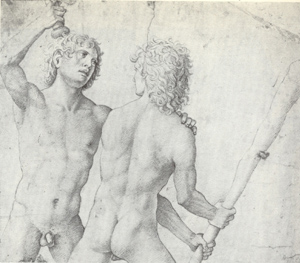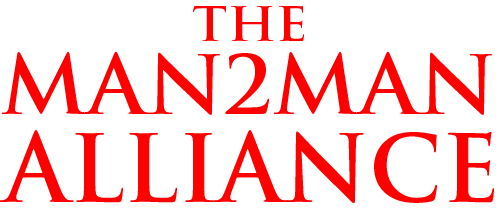










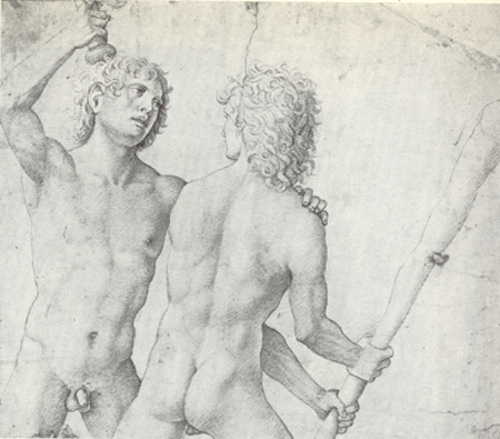
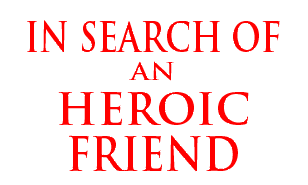
by GentleWarrior Brad
Bill Weintraub
dedicated to
In his Personal Stories post, Learning to be a Cockrub Warrior, GentleWarrior Brad described how, as teens, he and his brother, bitter antagonists, developed a frottage relationship that, despite being intense, did not heal the hate between them
Reading Brad's post reminded me of the absence of cultural supports for people like ourselves.
As a young child, Brad, like myself, wanted an heroic friend, a superhero. When he entered puberty, that desire became sexual as well.
Living in an intensely homophobic society, he wasn't able to cast far and wide for such a companion, and instead found only his brother. And although in frottage they could have a friendly relationship, the rest of the time they couldn't put their familial rivalry behind them, and remained, essentially, enemies.
That of course is very sad, and a large part of the problem clearly was societal homophobia. For although Brad describes his brother as essentially straight, they had a homosexual relationship for six years. So the reality I would think is more complex, as is suggested by his brother's friendship with bashers when he himself was involved in m2m sex - as we know now, it's common for bashers to have a secret sexual life with men - and it's possible that Brad's brother did with his friends, and, perhaps, still does.
But what a difference it would have made if Brad, and the rest of us, had been living in a culture that wasn't simply tolerant of homosex, but had myths and stories that supported it as well.
There have been such cultures, and there are such myths.
The greatest, I believe, is an epic called Gilgamesh, which was created in Sumeria, the world's first civilization, almost 5,000 years ago.
In Gilgamesh, two superheroes are brought together by the gods and, after a titanic wrestling match, become lovers. Their relationship is acknowledged and recognized by their society. They have a series of epic adventures together, in which their rallying cry is "Two people, companions, they can prevail!"
Eventually, the power of their love upsets the gods, and they send a sickness to Enkidu which kills him. Gilgamesh, devastated by grief, abandons his kingship of their great city and goes on a quest, unsuccessful, for immortality.
Gilgamesh presents a model for a same-sex erotically-bonded pair that's monogamous, heroic and noble - the exact opposite of our own culture's model for homosexuality, which is promiscuous, cowardly, and base.
And because of the importance of Sumerian culture, which spread throughout the Middle East and into Greece, that uplifting "Gilgamesh model" of homosex prevailed for thousands of years. Kids growing up with that model were not ridiculed for seeking an heroic friend - rather they were supported.
We can see that in the Iliad, which was written down about 2,000 years after Gilgamesh had first been recorded on cuneiform tablets. In the Iliad, Achilles and Patroclus are boyhood companions and lovers who go to war together. After Patroclus is killed, there's a brilliant but agonizing scene when his ghost comes to Achilles in a dream, asking that their ashes be mixed together after Achilles' own death, an act of great intimacy. Achilles readily agrees, and then attempts to hold Patroclus, saying, "Let us, if only for a little, embrace, and take full satisfaction from the dirge of sorrow."
But when he tries to touch Patroclus, Patroclus vanishes - he is just a ghost after all - and Achilles awakes in a torment of grief.
The gods then give Achilles a choice: he can leave the war, go home, and live to a ripe old age, or he can stay and avenge Patroclus' death - in which case, he'll be killed himself.
Achilles of course chooses to avenge his heroic friend's death, in so doing killing another warrior, Hector, who is himself a noble and great man.
We know that these sorts of mythic stories influenced behavior, because we can see that influence in the real lives of people like Harmodius and Aristogeiton, Athenian lovers who chose to die fighting tyranny rather than submit to it. Or of Alexander the Great and Hephaestion, boyhood friends and lovers and inseparable companions. The grief Alexander felt at Hephaestion's death - he lay atop the corpse for more than a day and had to be dragged off it by his men - without a doubt brought on his own, just three months later.
And so it continued all the way down to the Roman emperor Hadrian and his lover Antinous - about 3,000 years.
So culture - and cultural, that is mythic, models - really matter, and clearly all of our lives would have been better had we lived in a culture which supported us.
That's why in my writing I try to present an image of homosex which is noble, phallic, and heroic - because that's what cockrub and homosex are to me, and because I think that model is far preferable to the effeminate, cowardly, and anally promiscuous one of mainstream gay culture.
So as best I can, I want to support Bradley in his continuing search for his hero. As I do everyone in the club.
American culture - both gay and straight - belittles that quest. But that culture is dead wrong.
American culture is intensely materialistic and so worships death. It's a culture that is unconscionably destructive to the young - it eats its children, the way it ate Brad and his brother.

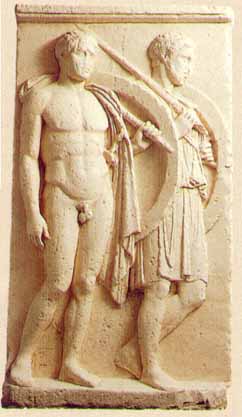
Heroic Homosex
Chairedemos and Lyceas
Athenian Warriors and Lovers
Who Died in Battle and Were Buried Together
This Athenian stele or grave marker presents a striking image from a culture of heroic homosex.
These men are lovers and soldiers who were killed during the Peloponnesian War and buried together. They're a pretty typical same-sex couple of the period. One has a beard, which indicates he's older, but clearly the difference in their ages is not great.
Athens was a pretty brutal place. It was a major slave society - one of the things that destroyed Greek democracy was the expansion of slavery - and it was almost constantly at war with other city states.
But it was also intensely creative. And who can compare the life of an American homosexual - surrounded by material luxury and hate - to that of an ancient Greek - barefoot and, by our standards, poor, but part of a great and ennobling culture, which admired and celebrated same-sex love.

AND



is presented by The Man2Man Alliance, an organization of men into Frot
Click here to read An Introduction to Frot and The Man2Man Alliance.
Click here to learn more about Heroic Homosex.
And here to learn more about Heroes.
Or here to visit our FAQs page and learn more about Frot Men.


© All material on this site Copyright 2001 - 2011 by Bill Weintraub. All rights reserved.
